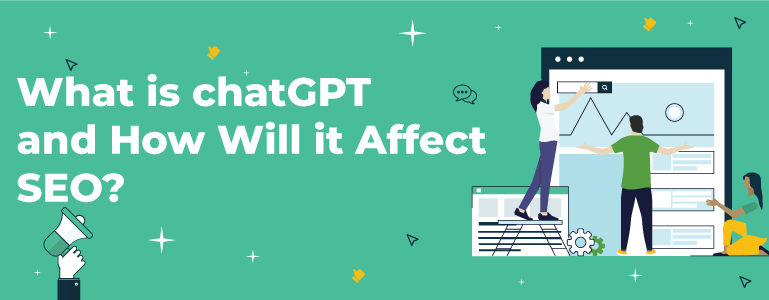What is ChatGPT and How Will It Affect SEO?
In today’s digital age, the way we interact with each other has evolved tremendously. One of the most significant changes has been the rise of instant messaging and chatbots, and ChatGPT is one such tool that has been making waves in digital marketing. In this article, we’ll give you a short rundown on ChatGPT, how it’s affecting content and SEO, and how AI detectors are catching up to recent developments in the field.
What is ChatGPT?
ChatGPT is an AI-powered chatbot that can converse with users like a human. But what does this have to do with SEO? Well, chatGPT can have a significant impact on the way search engines rank websites. Chatbots can keep people on a website longer and get them more involved by making the experience more personal and interesting, which, in turn, can lead to higher search engine rankings, as search engines tend to favor websites with low bounce rates and high engagement levels. So, if you want to boost your website’s SEO, ChatGPT might be the tool you need.
Even though ChatGPT is impressive, it can’t replace good old Google. Google is a technology company with a search engine that offers a wide range of goods and services. ChatGPT, on the other hand, is a language model made by OpenAI. ChatGPT can provide information and answers but cannot take over something like Google.
How will it affect SEO
ChatGPT could affect SEO (search engine optimization) roundaboutly by changing how people use websites and search engines.
ChatGPT has the potential to revolutionize the way people search for information online. For example, people may use natural language queries when searching for information rather than traditional keyword-based searches as ChatGPT and other natural language processing models progress. It could affect how search engines rank content and provide results.
ChatGPT’s capacity to generate high-quality, naturally-sounding material is another possible SEO influence. It might become more challenging to distinguish between human- and machine-made content when more websites use ChatGPT and other AI-powered tools to create content. It could change how search engines rank websites and show search results since they may need to change their algorithms to account for the rise of AI-made content.
ChatGPT isn’t likely to directly affect SEO, but it could have significant indirect effects by changing how people look for information online and how content is made and ranked. And when it comes to AI-generated content, how effective is current AI detection software against ChatGPT and others like it?
AI Detection vs. AI
AI detection software uses machine learning algorithms to find and classify objects, people, or patterns in data. In the past few years, this technology has become more advanced and is now used in many fields, such as security, healthcare, and finance.
One of the best things about AI detection software is that it can quickly and accurately analyze a lot of data. These systems can find subtle patterns or oddities that human analysts might miss, making it easier for organizations to spot potential AI-written content.
However, it’s important to note that AI detection software is not 100% accurate. As with all machine learning algorithms, these systems depend on the quality and amount of the data they are trained on. The systems could be biased or make mistakes if the data is incomplete or wrong. Also, these systems need help with data that is hard to understand or unclear, which can cause false positives or negatives.
Even with these issues, AI detection software is still beneficial, and as technology improves, AI detection systems will likely become more competent and more accurate in the future.
As a natural language processing model, ChatGPT can be a helpful SEO (search engine optimization) tool in many ways. One significant advantage is its capacity to generate high-quality, natural-sounding content. ChatGPT could be an excellent place to find new content for blog posts, articles, and other pages on your website. It can benefit websites that need help coming up with new content daily, giving users valuable and relevant content and helping with the website’s search engine rankings.
ChatGPT’s capacity to evaluate and interpret user intent is another possible use of SEO. ChatGPT can help determine users’ interests and why by analyzing user searches and interactions. This lets website owners tailor their content and communications to meet their audiences’ needs better. It can boost user engagement and contentment, leading to higher search engine rankings in the long run.
It’s important to remember that ChatGPT is not a replacement for standard SEO techniques. It can be a helpful tool for creating content and figuring out what users want, but it can’t replace keyword research, building links, and other basic SEO techniques. Lastly, a good SEO campaign needs technical knowledge and creative content creation, and ChatGPT could help you find this balance.

